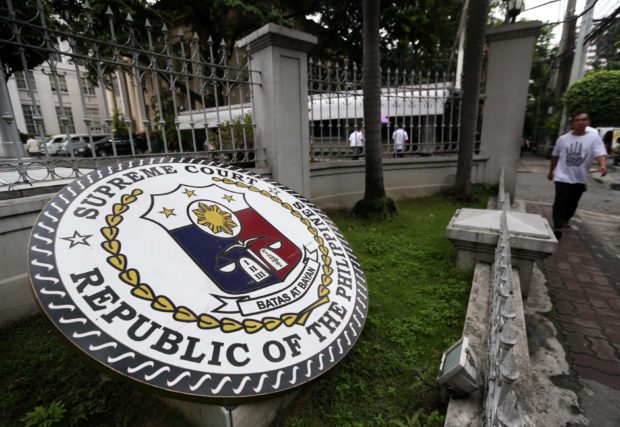SC stops PNP surveillance on family of slain suspected NPA

The Supreme Court symbol in Manila. (File photo LYN RILLON / Philippine Daily Inquirer)
MANILA, Philippines — The Supreme Court has stopped the Philippine National Police (PNP) from conducting surveillance operations on a family of a slain suspected member of the New People’s Army (NPA) reminding them to respect the rights of every citizen and follow protocol when conducting an investigation.
Covered by the permanent protection order (PPO) are Vivian Sanchez and her two children.
Police surveillance started in 2018 when Sanchez went to the funeral parlor to see the body of her estranged husband Eldie Labinghisa who was among the suspected rebels killed by the police in Barangay Atabay, San Jose, Antique.
A few hours after she left the funeral home, a police friend informed her that her photo was being circulated at the police station. Her friend advised her to tell the police of her husband’s name or they would go after her. She was also advised to cooperate with the investigation otherwise she will be put under surveillance.
A day later, Sanchez said three police officers threatened to arrest her and charge her with obstruction of justice if she will refuse to answer questions. Then, the police followed her to her house and showed her a photo of the body which she confirmed that it was Labinghisa.
Article continues after this advertisementSince then, Sanchez said she noticed the frequent drive-bys of a police car in front of her house and vehicle following her family when they attended her husband’s wake. Her 15-year-old daughter also noticed a vehicle following them to school.
Article continues after this advertisementThe police actions prompted Sanchez to file a writ of amparo before a Regional Trial Court. A writ of amparo is a remedy available to any person whose right to life, liberty, and security has been violated or under threat. Like a writ of habeas data, it serves as preventive and curative roles to curb extrajudicial killings and enforced disappearances.
The lower court, however, dismissed the amparo petition prompting her to take her case to the Supreme Court in a petition for review.
In a 19-page decision made public Thursday, the high court through Associate Justice Marvic Leonen, reminded the police officers “to uphold the rights of citizens as contained in the Constitution as well as to conduct investigations in accordance with their promulgated manuals including the Ethical Doctrine Manual.”
It pointed out that taking pictures of Vivian without her permission and putting it on display at the police station “is disturbing.”
“It appears as though [the police] sees nothing wrong in flagrantly and inexcusably violating petitioner’s right to privacy,” the high court said as it enjoined Police Superintendent Marc Anthony Darroca, Police Superintendent Leo Irwin Agpangan, Police Chief Superintendent John C. Bulalacao, and the police officers under their authority to abide by the PPO.
“The police officers’ brusque treatment of petitioner, threatening her with imprisonment and displaying her photo at the police station, does not reflect the professional and courteous image that the PNP wishes to convey as an institution,” the high court added.
The high court acknowledged that pursuing rebels “is a legitimate law enforcement objective.”
But it stressed that “the zeal of our police must be bound by the fundamental rights of persons, especially the loved ones of persons in interest. After all, the values we have in our Constitution are what differentiate us from lawless elements.”